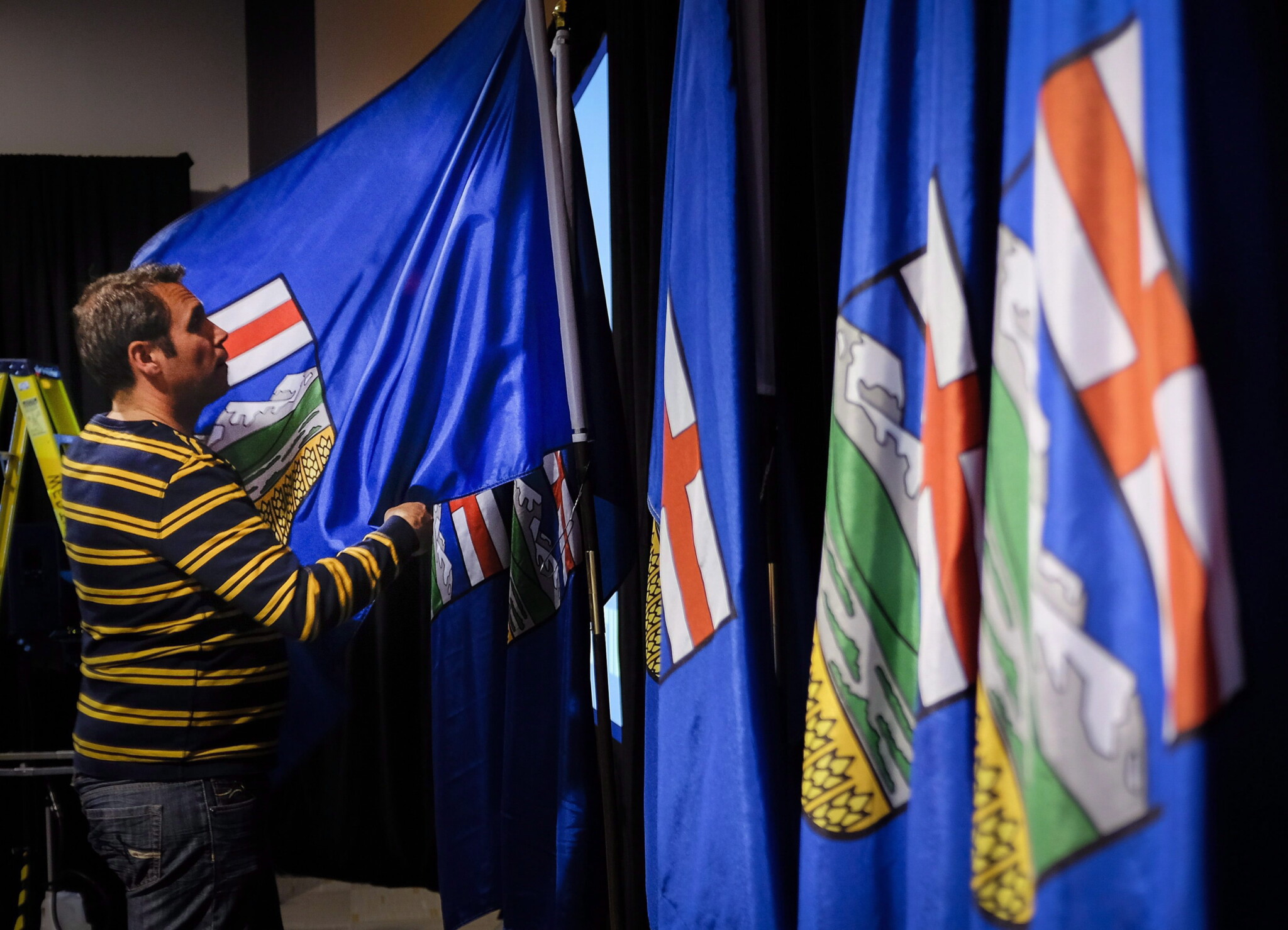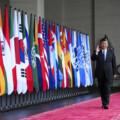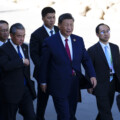When Alberta Premier Danielle Smith rolled into Red Deer and Edmonton in mid-July with her 16-member Alberta Next panel, she encountered no shortage of strong opinions. Some attendees were furious with Ottawa. Others were frustrated that this premier was reopening old questions about pulling Alberta out of the Canada Pension Plan.
The crowds ranged from die-hard federalists to committed separatists, and plenty in between who simply wanted a better deal.
The Smith government has been clear that these town halls are not meant to litigate separation. They’re meant to listen to Albertans and gather input to help create a “sovereign Alberta” within a united Canada.
Still, the events have attracted a broad spectrum of voices, including those who feel separation is the only path forward.
Whatever comes of these town halls, Smith has signalled that the feedback will help shape the province’s next steps, most notably in the form of referendum questions that could be put to voters.
Against that backdrop, a recent episode of Alberta Edge offers a thought-provoking counterpoint. The Hub flipped the separatist script and asked: If Alberta were already independent, what would it take for it to join Canada today?
Canada West Foundation president and CEO Gary Mar and University of Alberta political scientist Jared Wesley took the question seriously. In doing so, they exposed which Alberta grievances are rooted in fact, and how much of what Alberta wants could be achieved within Confederation.
Some irritants are real—and fixable
Alberta’s grievances are not imaginary. They’re mathematical.
If the province were to join Confederation today, it would likely demand a rebalancing of electoral representation, transfer payments, and jurisdictional authority.
Take Prince Edward Island, a province with only 180,000 people, or less than 4 percent of Alberta’s population of about 5 million. It has four senators versus Alberta’s six. That’s a ratio of almost 20 to one per capita—a stark imbalance not just for Alberta, but other Western provinces too.
That problem carries over into the House of Commons between redistributions, where Alberta’s rapid growth routinely leaves it underrepresented.
“The asymmetry of how Alberta is represented in our House of Commons and in our Senate is striking in my view,” Mar said.
Another evergreen irritant is equalization.
Flip the question of separation, and it becomes even more of a deal breaker. What independent jurisdiction would want to join a union where billions of their citizens’ tax dollars get redistributed with little control over where they go or how they’re used?
Mar, who held several cabinet posts as a former Alberta MLA from 1993 to 2007, said these issues are worth raising in town halls.
“I don’t think there’s any complaint that you would have in helping support Atlantic provinces, smaller provinces, [like] P.E.I, New Brunswick, Newfoundland and Labrador,” he said.
“But the idea that Alberta provides enormous resources; last year…it was about $13 billion that Quebec benefited from transfer payments,” Mar continued. “That’s the sort of thing that [Smith] is looking for [in] a different deal, and I think she’s reflecting the views of a significant number of Albertans who have grief over a topic like that.”
Meanwhile, federal spending power continues to blur constitutional lines. Ottawa often launches programs in areas of provincial jurisdiction, such as health and education, by tying funding to specific conditions.
Mar called it part of Ottawa’s “constitutional creep.”
“The federal government seems to be of the view that it, using a curling analogy, has the hammer at the end of every end of the match and they get to decide what their own jurisdiction is,” he said.
In the thought experiment, Mar suggested the creation of a three-person arbitration panel, where the federal government would appoint one person, the provincial government another, and the two come to agree on appointing a third member.
In theory, such a mechanism could help manage jurisdictional disputes. Currently, some of those fights end up in court.
The province has, for example, successfully challenged the federal government on constitutional grounds—most notably when the Supreme Court struck down key parts of the Impact Assessment Act (Bill C‑69) for overstepping into provincial jurisdiction over natural resources, infrastructure, and environmental approvals.
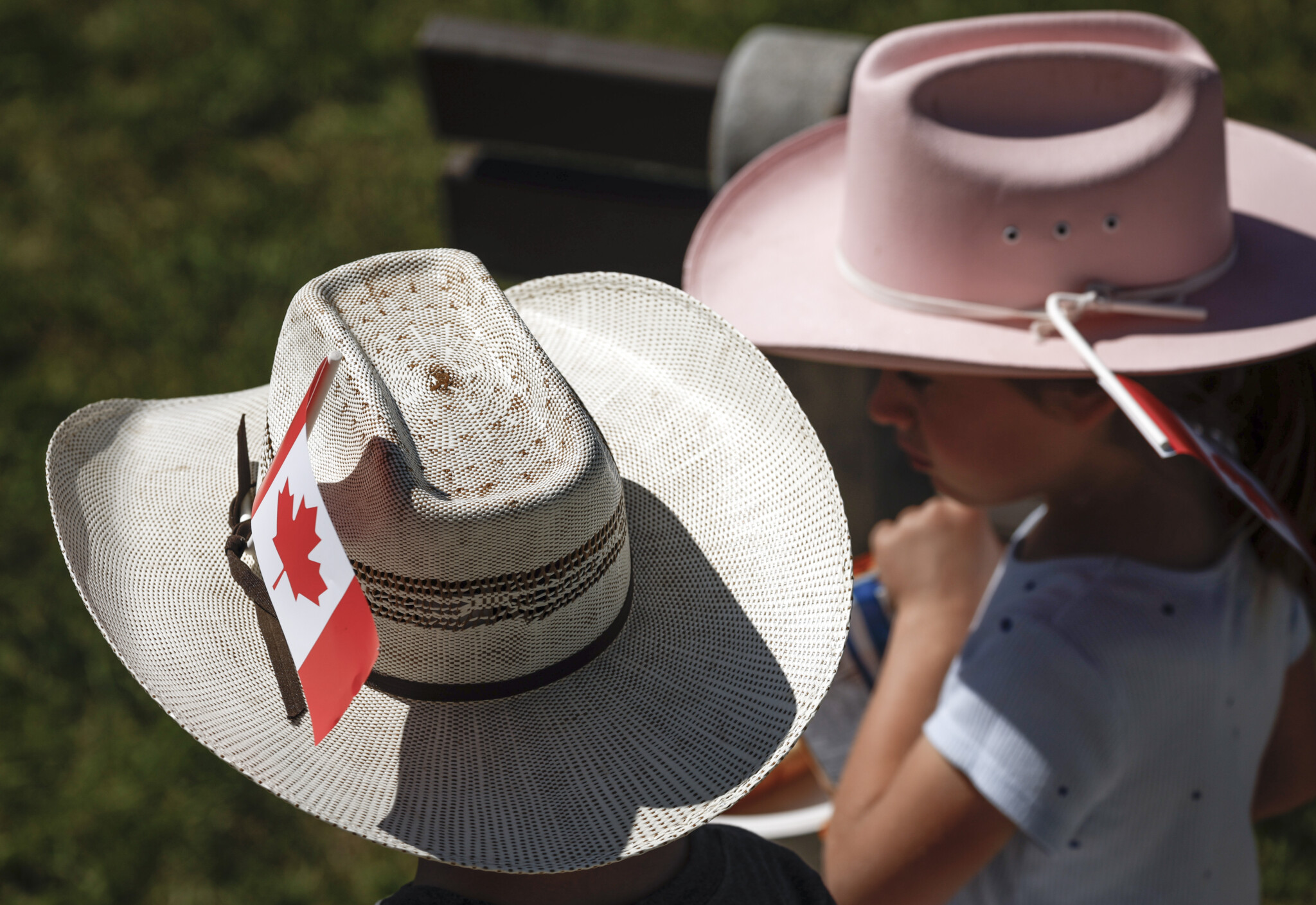
Young Canadians show their patriotism during a Canada Day parade in Cremona, Alta., Tuesday, July 1, 2025. Jeff McIntosh/The Canadian Press.
Canada beats Alberta in branding, international reputation
Mar’s experience as Alberta’s former envoy in Washington and Hong Kong revealed a hard truth: no one overseas asks for “Alberta beef.”
Instead, they want Canadian beef.
“People want to market Alberta beef abroad. And I’d say, why would you do that?” Mar recalled his conversations with Alberta beef producers.
“Just as you cannot distinguish Yunnan [province] from the rest of China, neither can the marketplace distinguish Alberta from the rest of Canada.”
He pointed to Australia as another example.
“They don’t market wine from New South Wales or beef from Western Australia,” he said. “It’s Australian universities; It’s Australian beef; It’s Australian wine that they market.”
The majority of Canadian beef exports may come from Alberta, but it’s the Canada brand that earns global trust and premium prices
These advantages are so ingrained in daily life that they often go unnoticed until you imagine starting from scratch.
The same goes for access to international trade deals, membership in NATO and NORAD, Canada’s top-tier credit rating, a stable currency, and one of the world’s most respected passports, all of which come included with Confederation.
“Alberta would be looking for global influence and international standing that they wouldn’t have on their own,” Wesley said about the benefits of joining the federation.
“They’d be looking for mobility and free-trade rights within Canada and all of Canada’s trading partners. And they’d want economic, financial, and fiscal stability that comes with being in Canada,” he said.
Flip the question back to today’s separation debate, and the challenge becomes even clearer. Wexit would require Alberta to rebuild international trust and recognition, with no guarantee the world would buy it.
“In the case of Alberta leaving Confederation, they wouldn’t be guaranteed to be entered into those agreements just as a successor,” Wesley warned.
Demanding a pipeline is realistic
When British Columbia joined Confederation in 1871, it didn’t do so unconditionally. In exchange, Ottawa promised a transcontinental railway linking the Pacific coast to the rest of the country.
Newfoundland and Labrador, too, negotiated its entry in 1949 with guarantees over fisheries, school systems, and federal subsidies. These were pragmatic, interest-based bargains.
The same logic could be applied to Alberta.
“Right off the top, perhaps a province like Alberta would say, ‘We want guaranteed access to tidewater for the things that we produce in our province,’” Mar said. “That would be a realistic thing.”
Precedent exists for provinces to negotiate terms that recognize their geographic, economic, and political realities. Alberta could—and should—seek the same.
Recently, Smith has adopted a similar line of thinking in explaining her interest in remaining within Confederation.
“I guess the way I look at it is I want to get a pipeline built to the northwest B.C. coast. If we are part of Canada, I have to deal with B.C. If we’re not part of Canada, I still have to deal with B.C. I think it would be a whole lot easier for me to have those negotiations [at] the table that I’m at right now,” the premier said in Red Deer.
Separatism is driven more by money than identity
As the lead researcher behind the Common Ground project, Wesley has spent years studying Western Canadian political culture through empirical surveys. His group’s findings suggest the roots of separatism are overwhelmingly economic.
“Almost three-quarters of separatists believe it’s for economic and fiscal reasons, and only about a quarter think it has anything to do with culture and identity,” Wesley explained.
“In fact, among separatists, 62 percent have at least some level of attachment and feeling of belonging to Canada, which is why at a separatist rally, there was a reporter that reported he saw people wearing Canada Day shirts,” he added.
Wesley mused that perhaps this is why even some members of the Alberta Prosperity Project are promising followers that, should Alberta go its own way, citizens would be able to keep their Canadian passports.
“They see some of the value in this stuff,” Wesley concluded.
Mar agreed that many Albertans haven’t fully thought through the consequences of separation.
“It’s sort of like saying, ‘We’re getting divorced, but I still want sleeping privileges,” Mar said. “Confederation is a basket of goods and services and benefits. If you were negotiating to leave the country, the federal government’s proper response would be, ‘Well, ok, take your share of the national debt, take your share of the military, but you don’t get to use Canadian currency.’”
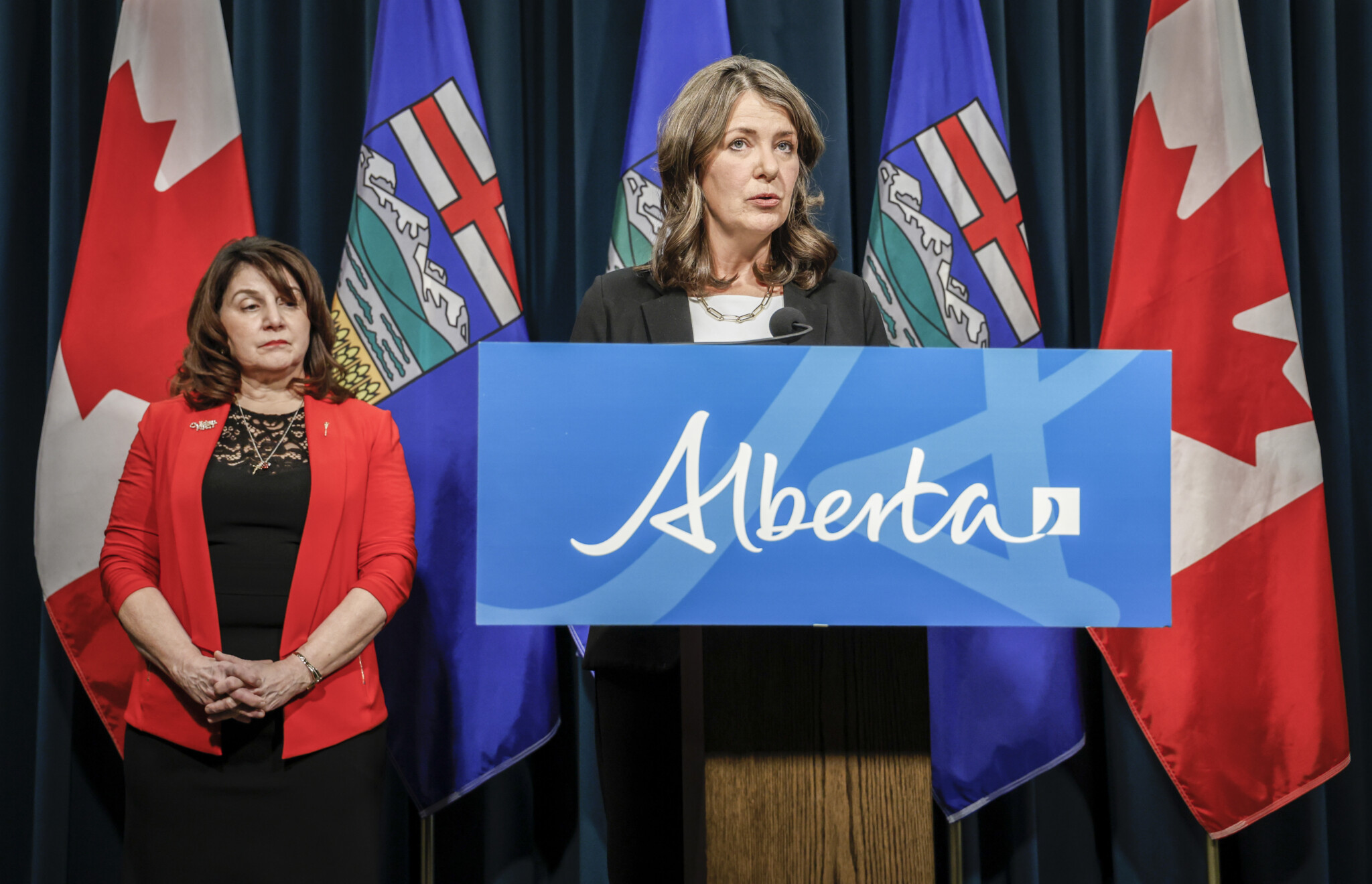
Alberta Premier Danielle Smith in Calgary, Alta., Wednesday, Feb. 19, 2025. Jeff McIntosh/The Canadian Press.
Any ‘Wexit’ referendum will be about emotions
Wesley recounted advice he recently received from a British diplomat who spoke from the Brexit experience.
“She’s like, ‘If I could give you one piece of advice—recognize that as soon as that writ is dropped on the referendum, it’s no longer about facts and rationality. It’s all about identity and emotion,” he recalled.
Referendums may be designed as tools of direct democracy, but in practice, they often become blunt instruments of protest.
“They want a referendum so it’s just close enough so that they have the leverage necessary to get what they want out of Confederation,” Wesley said. “It’s a dangerous game. Just ask David Cameron.”
Wesley pointed to Quebec’s 1995 referendum as another example.
“Pollsters at the time estimated somewhere between four and eight percent of the vote were people that did just that,” he said. “‘Let’s just give them as much leverage as we can.’”
If a referendum is used to bluff or bargain, rather than to make a clear decision, the results can be destabilizing—and irreversible.
For some, that’s precisely the point.
Frustration cuts across party lines
Alberta’s grievances aren’t just a partisan talking point. According to five years of survey data from Wesley’s work, they reflect a deeply held sentiment that transcends party affiliation.
“Albertans feel jilted,” Wesley said. “This isn’t just conservatives. This isn’t just Danielle Smith. This is Albertans across the spectrum.”
Many Albertans feel taken for granted, misunderstood, and unappreciated, especially during economic downturns.
“They feel like Alberta is there for everybody else when they’re falling upon hard times, and we’re the economic engine of Canada. When we fall on hard times, nobody’s there for us,” Wesley said.
That sense of betrayal has become a recurring theme in separatist rhetoric—sometimes going as far as describing the Alberta–Ottawa relationship as “abusive.”
Wesley offered a gentler take.
“It’s unrequited love,” he said.
It’s clear the country has yet to reconcile with these strong emotions. It may explain why in Red Deer, every time someone at the Alberta Next town hall raised the spectre of separation, it drew more cheers than jeers from the crowd.
Alberta is a federal construct sitting on Treaty land
All hypotheticals aside, one issue makes the thought experiment in either direction especially complex.
While Alberta has negotiated with Ottawa on various issues over time, its creation as a province wasn’t the result of a deal.
Unlike provinces that negotiated their way in, such as Nova Scotia, New Brunswick, Ontario, and Quebec (1867), British Columbia (1871), Prince Edward Island (1873), and Newfoundland and Labrador (1949), Alberta was carved out by the federal government in 1905 through the Alberta Act.
“It was created out of the Northwest Territories, which were under federal government control,” Wesley explained. “Ottawa drew the boundaries of the province. So if we’re talking about an independent Alberta, it wouldn’t look like it does today without the federal government’s involvement.”
That history carries weight—especially for Indigenous communities.
Alberta sits on Treaty 4, 6, 7, 8, and 10 lands—solemn agreements signed between First Nations and the Crown between 1874 and 1906. These treaties established the sharing of land and resources in exchange for federal promises related to education, healthcare, and financial support.
Any move toward independence would trigger serious legal and constitutional questions about who would inherit and uphold those obligations.
“They can’t simply declare that they’re going to inherit those treaty obligations from the Canadian state,” Wesley said of separatist groups. “Treaties themselves would have to be completely renegotiated, including sitting down with First Nations and, in all likelihood, with Métis.”
A better path forward
As both Mar and Wesley pointed out, Alberta doesn’t need to leave Canada to get a better deal.
“I think that the angst is a disagreement with Ottawa, it’s not necessarily a disagreement with being part of Canada,” Mar said.
And not every disagreement needs to be settled in court or through a referendum.
Alberta has successfully negotiated for more control in the past. Wesley pointed to the Social Union Framework Agreement of 1999 and former prime minister Stephen Harper’s “open federalism” as examples of Ottawa granting provinces greater flexibility.
“I hold out hope that we can resurrect some of those good ideas from the past,” Wesley said.
The emotional pull of grievance is strong. However, building a future that’s more prosperous, fair, and better aligned with Alberta’s takes more than frustration—it necessitates strategy, unity, and clear goals.
Confederation, for all its flaws, can still offer the most effective path to getting there.
